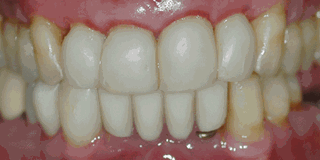Is there a link between gum disease and heart health?

Gingivitis is usually the first stage of gum disease.
About two thirds of people older than 65 have gum disease, more formally known as periodontal disease. It starts when plaque, a sticky film of bacteria and food builds up around the teeth. In its earliest stage (gingivitis), irritated gums can bleed easily. Left untreated, periodontal disease can worsen and in its most severe form, cause the teeth to loosen and fall out.
Compared with people who have healthy gums, people with periodontal disease are about twice as likely to have to a heart attack. Shared risk factors including smoking, an unhealthy diet and lack of access to health and dental care may explain a bit of this association.
However, some bacterial and viral infections also appear to increase the risk of heart attack and stroke and growing evidence suggests that bacteria and inflammation may underline the link between the mouth and the heart.
The bacteria responsible for periodontal disease can travel to blood vessels throughout the body and have been found in the fatty debris or atherosclerosis that clogs arteries located far from the mouth. It has also been found in blood clots from people who have experienced heart attacks.
How to keep healthy gums
Proper brushing. Brush at least twice a day using a soft bristle toothbrush and fluoride toothpaste. Replace your toothbrush every three to four months or sooner if the bristles begin to fray.
Choose the right toothpaste. When choosing toothpaste, one should ensure that it contains fluoride and has the Uganda Dental Association seal of approval on the packaging.
Floss daily. Flossing removes food from between the teeth and gums.
Stop smoking. Smoking makes a person more susceptible to gum disease since it weakens the immune system.
Get regular dental checkups. Dental checkups typically include a professional cleaning or scaling of the mouth. Professional cleaning is the only way to remove tarter from the teeth. It also eliminates the plaque that a person may have missed when brushing their teeth. With regular visits, a doctor can help identify the early signs of gum disease. Visit a dentist at least every six months if you want to keep your teeth and gums healthy.
Dr Muhammad Matovu, dental surgeon




